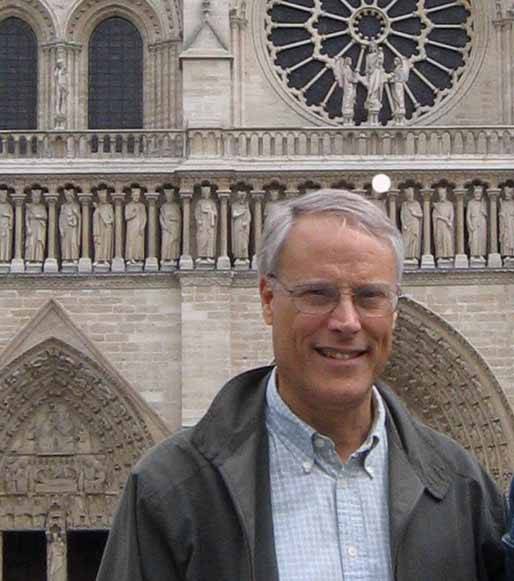Kenneth Margerison

Distinguished Professor Emeritus
Email: km04@txstate.edu
Educational Background :
Ph.D. - Duke University
B.A. - University of North Carolina
Current Research Interest :
The French in India after 1763
Kenneth Margerison has taught at Texas State University since 1972, serving as chair of the Department of History from 1994 to 2000. He regularly teaches courses at the undergraduate level on the Renaissance and Reformation, Old Regime Europe, the French Revolution, and Modern France. At the graduate level, he conducts a seminar on eighteenth-century Europe. He was named Piper Professor in 2013.
Awards and Accomplishments:
Piper Professor 2013; Everette Swinney Faculty Senate Teaching Award 2005, 2006, 2013
Select Publications
“Rogue Diplomacy: Sartine, Saint-Lubin and the French Attempt to Recover ‘Lost India.’" French History 30, (2016): 477-504.
“French Visions of Empire: Contesting British Power in India after the Seven Years War,” English Historical Review, 130 (June 2015), 583-612.
“Commercial Liberty, French National Power, and the Indies Trade After the Seven Years’ War,” Historical Reflections, Réflexions Historiques 35 (2009): 52-73.
“The Shareholders Revolt at the Compagnie des Indes: Commerce and Political Culture in Old Regime France,” French History 20 (2006): 25-51.
“The Pamphlet Debate Over the Organization of the Estates General,” The Origins of the French Revolution, ed. Peter Campbell, Palgrave-Macmillan, 2005.
Political Pamphlets and Public Opinion: The Campaign for a Union of Orders in the Early French Revolution. West Lafayette: Purdue University Press, 1998.
Courses Taught
HIST 3312 | Renaissance and Reformation
This courses examines the transition of Europe from medieval to modern during the era of the Renaissance and Reformation (1400-1600). The course will naturally deal with the entire phenomenon of the Renaissance including the development of capitalism, state-building, the explorations and origins of European colonialism, and the cultural manifestations of humanism. Likewise, the course will examine the dramatic religious challenge that Martin Luther and the Protestant Reformation leveled at the Roman Catholic Church as well as the political and social changes that emerged from that struggle. The course will analyze both the high and low culture of this period of European history in order to provide the student with a well rounded picture of early modern European society. Since Europe in this period was blessed with a number of colorful historical personages, including Pope Alexander VI, Torquemada of the Spanish Inquisition, Christopher Columbus, Henry VII of England, Martin Luther, Mary Queen of Scots, Catherine de Medici, and Philip II of Spain, the course provides students with ample opportunity to assess the role of the individual in history. In the strange cases of Menocchio and Martin Guerre, the student will have the opportunity to determine if the lives of unknown Europeans might not even be more interesting that the lives of the great men and women of the period.
HIST 3313 | Old Regime Europe
The Old Regime, the 150 year period of European History which preceded the French Revolution of 1789, is a fascinating era which included such important phenomena as the rise of modern science, the development of absolute monarchy, and the appearance of the Enlightenment. Society was in certain respects rigidly hierarchical with certain groups enjoying privileges unavailable to most individuals. On the other hand, there were numerous means by which social boundaries could be bridged. The course attempts to provide the student with an insight into the political structure of the era and with an understanding of the mentality of Europeans of all social classes. The class will consist of lectures and class discussion. Class discussions will revolve around specific reading assignments.
HIST 3314 | Revolutionary Europe
Between 1760 and 1800 a revolutionary movement swept through Europe bringing massive political, social, and cultural change to many parts of the continent but most particularly to France. The course will introduce students to the dynamics of this international revolutionary movement at the end of the eighteenth century. Attention will be given to the political, social, and cultural origins of the movement as well as to the development of revolutionary government in all of its various phases. Particular emphasis will be placed on the emergence of the concept of human rights during this era. Students will acquire an understanding of revolutionary mentality through the analysis of primary historical documents. The development of the student's skills in writing and historical analysis and will be emphasized in the various paper assignments and the essay examinations.
HIST 5309A | Interpreting the Eighteenth Century
This course will provide a survey of the most interesting and important historiographical problems of eighteenth-century Europe. Among the topics to be examined will be the social history of the eighteenth-century aristocracy, peasantry, and urban dwellers; the Enlightenment and its relationship to social and political history; the political culture of the period; and the origins of the French Revolution. Much of the course material will focus on France, but attention will be given to other European countries. Students will be responsible for reading specific assignments on a weekly basis, giving oral reports to the class, and writing short, weekly papers. The course will conclude with a final examination written outside of class.
